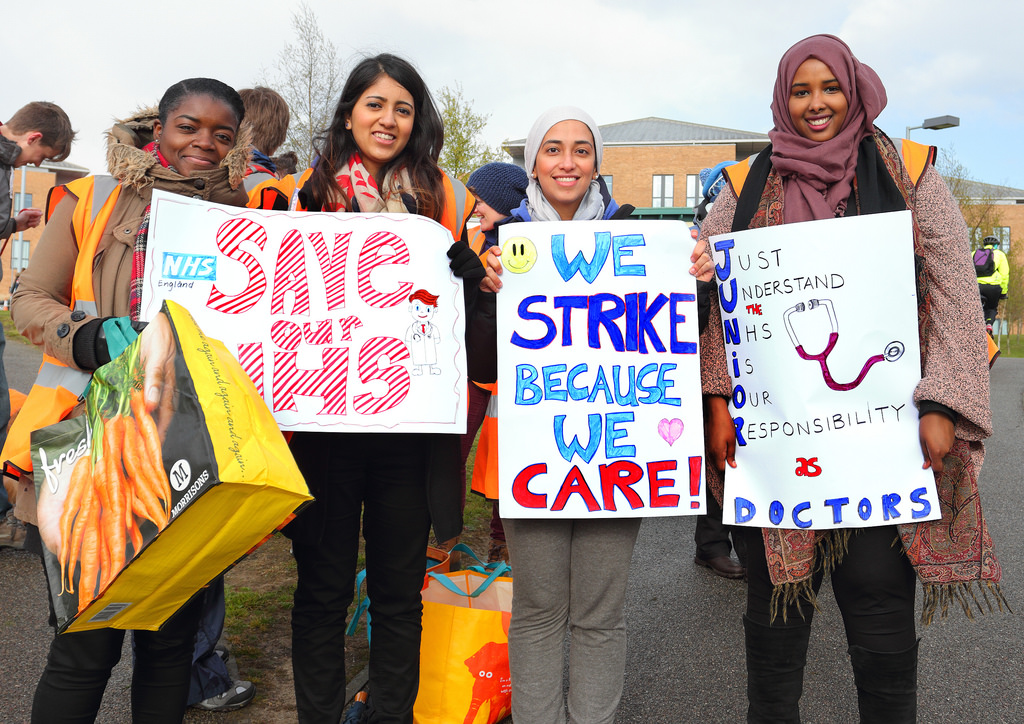‘The government destroyed their trust’ – Reflections on the Junior Doctor Dispute and Next Steps in Defence of the NHS
by Nicolas Carpenter
9 July 2016

Since November when we said that the contract on offer to junior doctors was #notsafenotfair there have been six strikes, three threats of imposition, two returns to the negotiating table and a referendum on the ‘this-time-we-really-mean-it’ final contract – which was rejected by 58% of doctors who voted this week in a 68% turnout. Now on Wednesday, under the cover of the Chilcot report, Jeremy Hunt’s at it again, threatening to impose a contract when it’s not even clear he has the power to.
1. In many ways the strikes have been hugely successful.
Even if we are facing another attempt at imposition, the battle for public opinion has been engaged and in most cases squarely won by junior doctors – Hunt is a proven liar, humiliated, one of the most hated politicians in the country, and the first health secretary to preside over a full walk-out in the history of the NHS. What a legacy.
The impact on the public debate has been to solidify suspicions. On the picket lines and amongst the public it is clear to most that this is about dismantling the NHS, even if it isn’t always clear how. This is despite an explicitly apolitical stance by the British Medical Association (BMA).
Perhaps ironically the dispute has succeeded in politicising a whole generation of junior doctors – a traditionally small-C conservative group. This could prove crucial in the fight for the NHS to come.
2. 28% of junior doctors voted to accept the hard-won concessions of an improved contract.
Johann Malawana, lead negotiator for the BMA, repeatedly told the membership that this offer was the best deal we were going to get under the circumstances.
On the face of it there were a number of improvements. Some of the original safeguards which we had demanded were conceded: a maximum 72-hour week, maximum number of nights that could be worked in a row, the introduction of a new ‘guardian’ to flag-up exploitation, and an obligation for hospitals to publish safety data on how many locum doctors are used to plug gaps. A ‘flattened’ pay scheme was proposed to link responsibility to reward. Some people stood to gain.
3. 32% abstained from voting – and who can blame them?
As nice as some of the concessions sounded, many of the proposed fixes are untested. For example the guardian role may be open to abuse as it requires signing off of late-working by your seniors, who may refuse or place pressure on juniors to keep quiet. As in every other reorganisation of the NHS, evidence that the proposals actually work is non-existent.
One failure of the BMA was that it was never clear what a fair or safe contract would look like. We had arrived at this point after years of pay decreases, under-recruitment and stretching services. Once doctors had become engaged in the contract dispute, people began to see how bad the current situation had become. Many people abstained simply out of indifference, seeing no significant benefit in either contract and no point to voting – it was clear that Hunt would announce imposition either way, making a mockery of the whole affair.
4. 40% of doctors rejected the contract as still not safe, still not fair.
Fundamental issues remain unanswered. Is the government going to respond to the recruitment crisis? What of the so-called ‘seven day NHS’? Is the pay-packet still cost neutral?
Is it fair for women and less-than-full-time workers? It seems no one is sure, which is not acceptable. A legal challenge is being made against the contract for failing to make an equality impact assessment.
The BMA attempted to work with the government’s preconditions: a cost-neutral contract; a seven day NHS with five days’ funding – AKA more work for fewer people on stagnating wages. Maybe this was the best possible contract under those conditions – now we have to challenge the very presuppositions.
5. Looking forward: the BMA enters the trade union movement.
It might be that Hunt – toxic goods – is soon replaced as health secretary in a cabinet reshuffle. Renegotiations may be able to continue with a new health secretary. It will be hard to resist people starting on the contract as rotas have been drawn up around the country and the next cohort is due to start in less than a month. Appetite for striking is reduced from fatigue but resentment remains high. The disdain that our elites are showing for the democratic process by imposing a rejected contract is plain for all to see.
Ultimately the BMA must abandon pretensions that this is an apolitical issue. Johann Malawana has stepped down as junior doctor committee chair with grace and with scathing words for the way this whole debacle has been handled.
Ellen McCourt, the left’s choice candidate has taken over on a temporary basis. The next steps will be to establish as many left candidates in senior roles as possible and use their influence to stand with our nurses, and reach out to teachers and all public sector workers. Within a wider trade union movement, this can and must be made into a fight for the NHS and, with determination, a nail in the coffin for austerity politics.
Photo: Roger Blackwell/Flickr
–
If you want to support media for a different politics, you can donate or subscribe to Novara Media at support.novaramedia.com.